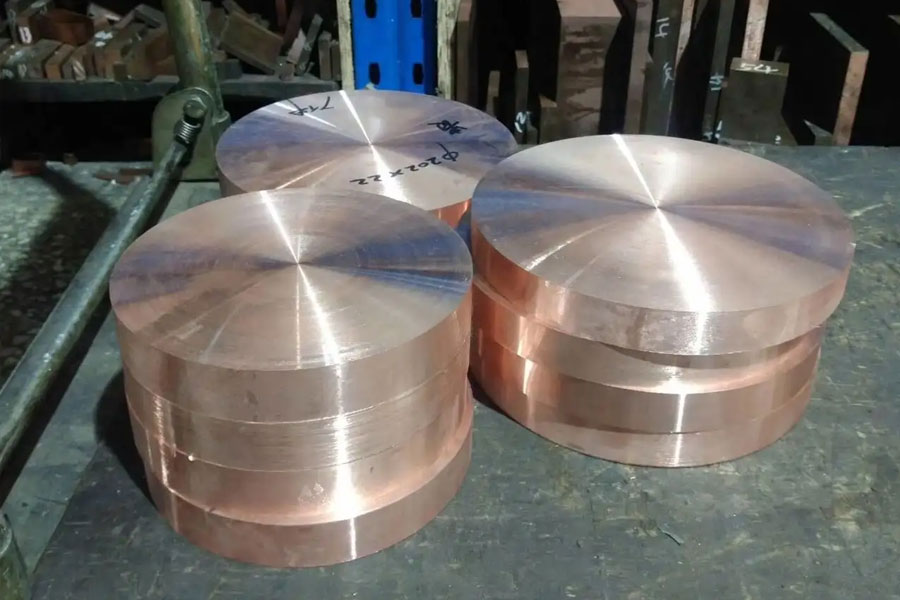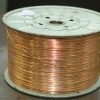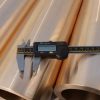
Beryllium copper alloy is a malleable and castable alloy. It is an aging precipitation strengthened copper-based alloy. After quenching and aging treatment, it has high strength, hardness, elastic limit, and good stability. It has corrosion resistance, wear resistance, fatigue resistance, low temperature resistance, non-magnetic, good electrical and thermal conductivity, It has a series of advantages such as no sparks when impacted, and is known as the “king of colored elastic materials”.
Beryllium-copper materials are basically divided into high-strength and high-elasticity beryllium copper alloys (1.6%-2.1% beryllium content) and high-conductivity beryllium-copper alloys (0.2%-0.7% beryllium content); According to the product forming method, it is divided into processed alloy and cast alloy. In recent years, the application range of beryllium copper alloy has gradually expanded, and it is widely used in various fields such as electronic appliances, communication equipment, aerospace, petrochemical, metallurgy and mining, automobile household appliances, machinery manufacturing and so on. It has become an indispensable important industrial material in the construction of the national economy. Beryllium copper alloy is the main form of beryllium consumption in the world. Accounted for 65% to 75%. Throughout the 1980s, beryllium copper alloy consumption grew at an average annual rate of 6%. Accelerated to lO% in the 1990s. Growth was mainly driven by the electronics industry with telecommunications and digital communications as its backbone. By the end of the 1990s, growth was particularly strong, fueled by the enormous stimulus of mobile telephony and the Internet.
Simultaneously,New applications for beryllium-copper alloys in the automotive electrical and electronics market are also being vigorously developed, driven by lower automotive emissions requirements in the automotive industry, with global consumption of beryllium-copper alloys estimated at about 27,300 tonnes in 2007, according to CRU estimates. Compared with foreign countries, the main problem of beryllium copper production in my country is that the level of technical equipment and automation control is backward. The average comprehensive energy consumption of my country’s beryllium copper industry is 2 to 3 times that of developed countries, mainly due to the combined effect of many factors such as small equipment scale, low degree of automation, backward technology and equipment, and low yield. . This paper briefly introduces the main properties and heat treatment process of beryllium copper alloy at home and abroad, and the development status, trend and application of beryllium copper industry market. ’
The Application Of Beryllium Copper Alloy In Mold Material
Beryllium copper mold material. Injection and blow molding for thermoplastic processing in the production of plastic, glass and metal products. Beryllium copper alloy has good casting properties. It is easy to produce castings with high precision, complex shapes and clear patterns: high strength, high hardness, good wear resistance and corrosion resistance; high thermal conductivity improves the forming cycle; long service life; easy welding repair, and strength is not lost; No rust, easy to repair and maintain, etc.; the demand for this purpose is quite large. BrushWellm Co., Ltd. has specially developed Moldmax and Protheml beryllium copper alloys for the plastics machining industry. Moldmax is used for neck rings, handle inserts and injection mold parts, cavity inserts, blow mold clamps, hot runner system injection nozzles and manifolds, etc. in plastic injection molding; Prothe coffee is used for foam plastics. cnc machining, hot runner systems and other applications where heat removal or control is critical.
Berylco Berylco beryllium copper alloy plate products produced by NGK Metals for this purpose are divided into three grades such as Plus (Plus), Ultra (Supra), Ultra Ultra (Ultra) negative. In terms of casting molds, Be-Cu alloys have much greater heat dissipation properties than steel, and are used as mold materials for precision molds and plastic products. After vacuum melting and adding 0.2% rare earth Nd, Zhuang Jianping found that the elongation of beryllium bronze was greatly improved, and the high beryllium bronze (1.9% to 2.0% of Be) was increased from 2% to 2%. ~5% increased to 9%, low beryllium bronze (0.45% ~ 0.55% of Be) increased from 8% ~ 13% to 19%. In actual use, compared with the ductile iron punch life, the life of the low beryllium bronze punch is increased by 5 times, and the life of the high beryllium bronze punch is increased by 10 times, and the comprehensive benefit is very significant. The hardness of beryllium copper can reach the hardness, strength and high thermal conductivity suitable for plastic mold manufacturing when the hardness is 36-42HRC. Cnc machining is easy and convenient, the mold service life is long, and the development and production cycle is saved. The thermal conductivity of beryllium copper material is beneficial to control the temperature of the plastic plus T mold, and it is also easier to control the molding cycle.
At the same time, the uniformity of the mold wall temperature can be ensured; if the molding cycle of beryllium copper is much shorter than that of the steel mold, the average temperature of the mold can be reduced by about 20%. When the average demolding temperature is between the average mold wall temperature When the difference is small (for example, in the case where the mold part is not easy to be cooled), using beryllium copper mold material, the cooling time can be shortened by 40%. The mold wall temperature is only reduced by 15%: the mold wall temperature uniformity is good, which improves the quality of the product; the mold structure is simplified, because the cooling pipes are reduced: the material temperature can be increased. Thereby reducing the wall thickness of the product. Reduce product cost. When the strength and hardness of beryllium copper meet the requirements. The insensitivity of beryllium copper to mold temperature stress can greatly improve the service life of the mold. The yield strength, elastic modulus, thermal conductivity and temperature expansion coefficient of beryllium copper should also be considered before determining the use of beryllium copper mold materials. Beryllium copper is far more resistant to thermal stress than die steel. From this point of view, the service life of beryllium copper is remarkable.
The Application Of Beryllium Copper Alloy In Automobile
Automotive electronic components are a significant consumer of beryllium copper tape. One of the main uses is in automotive engine compartment components, such as engine control systems. These parts have higher operating temperatures and severe vibrations. Vehicles produced in North America, Europe, Japan, and South Korea have increased use of electronic components. This is the result of manufacturers constantly adding new features to their cars. In the United States, automotive contactor consumption is another major market for beryllium copper alloys. the year 1995. BmSh, №llm Hoe Company disclosed that the sales of automotive electronics in the United States accounted for 18% of its total sales. Converted to pure beryllium about 41t. In the late 1990s, the rapid growth of beryllium copper in the automotive market prompted BmshWellm to develop a new low beryllium high conductivity beryllium copper alloy. 17l alloy. Alloy 17l is an alternative to 174. It is specially developed for the automobile industry, used in automobile relays and switches, and replaces Co with Ni, which can have a higher content of Sn, so the cost is lower. Automotive beryllium copper alloys will continue to increase as vehicle production and the number of electronic components per vehicle continue to grow. In short. The automotive industry is likely to be one of the fastest growing markets for beryllium copper alloys. in automobile manufacturing. Since the 1990s, one of the main growth markets for Be-Cu alloys has been automotive electrical devices, such as electronically controlled windows, seats, electronic dials and digital displays. Be. Cu alloys are also used in engine control wiring. It can work within 120℃ without being affected. In addition, Be. Cu alloys are also used in computers that control engines. Fuel and ignition can be monitored and controlled to reduce emissions.
The Application Of Beryllium Copper Alloy In Computer
The main trend of computer development is fast and stable data transmission, broadband and low power consumption. Compared with inexpensive materials, beryllium copper alloys have higher electrical conductivity, thermal conductivity, elasticity and strength, and thus better reliability. Computers are one of the largest markets for beryllium copper, used as springs, contactors (connectors), and switches. According to the International Data Corporation (IDC). Shipments of notebook computers in 2008 alone increased slightly from the previous forecast of 148.2 million units. At 148.5 million units, PC deliveries were down slightly from the previous forecast of 303 million units to 302 million units. Worldwide shipments of personal computers in 2004 reached 186 million units. An increase of 13.6% over 2003. Worldwide PC shipments in 2003 were 145.6 million units, down from the original forecast of 147.5 million units. Worldwide personal computer shipments in 2002 were 136.2 million units, an increase of 1.5 percent from 134.2 million units in 2001.
The Application Of Beryllium Copper Alloy In Electrical And Electronic Components
The largest applications of beryllium copper alloys are in electrical and electronic components, especially springs, contactors, switches and relays. Used as contactors in computers, optical communication equipment, sockets connecting integrated circuit boards and printed circuit boards (especially with beryllium copper wires), and automobiles. The increasing precision of mobile phones and notebooks is an important factor in the miniaturization of electronic components, requiring smaller, lighter and more durable contactors. This has led to an increasing demand for beryllium copper components [7t17]. in telecommunications. to Be. Cu alloys coated with precious metals can be used as contacts for telephone connectors. Be. Cu alloy 174 is coated with ductile material Ni. Used in cellular battery chargers. It can also be used as a part of cellular phones and mobile phones. 2007. The market demand for electronic components in China has reached 100.5 billion US dollars, accounting for about 46.7% of the total domestic electronic information product market, accounting for 24.2% of the world’s electronic components market, and still maintaining its position as the world’s largest component market . China’s semiconductor market shipments rose to $51.5 billion, up 15 percent from $44.8 billion in 2006. Global semiconductor sales revenue increased by 3.2% year-on-year. This was the sixth consecutive year of growth achieved by the global semiconductor market. Flat-panel TVs, 3G and portable digital products have become the hottest and the main driving force behind the growth of the semiconductor application market. 5 years from 2007 to 2011. The compound annual growth rate of China’s IC industry sales revenue will reach 27.7%. Expected to 2011. China’s integrated circuit industry sales revenue will exceed 300 billion yuan. reached 341.544 billion yuan. In terms of industrial scale, in 2007, my country’s electronic components ranked second in the domestic electronic manufacturing industry. Year 2008. The electronic components industry continues to hold the second position in the electronics manufacturing industry. According to preliminary calculations, in 2008, the sales revenue of enterprises above designated size in the electronic component industry was about 730.9 billion yuan, an increase of 11% over the previous year’s 658.5 billion yuan.
Other Industry
In addition to being used in the above fields, beryllium copper is also widely used in the following industries and fields: petroleum refining and oil and gas chemical industry, blasting and pyrotechnic manufacturing, dye and paint production, medicine, electrolysis 1 and 2 plants, aircraft manufacturing plants, tanks and shipyards, food processing industry, mining industry, chemical fiber industry, submarine communication cable repeaters, etc., see Table 2. The toxicity, brittleness, high price and other factors of beryllium limit the application and development of beryllium materials, but in spite of this, in the occasions where other materials cannot be replaced. Beryllium will still shine






